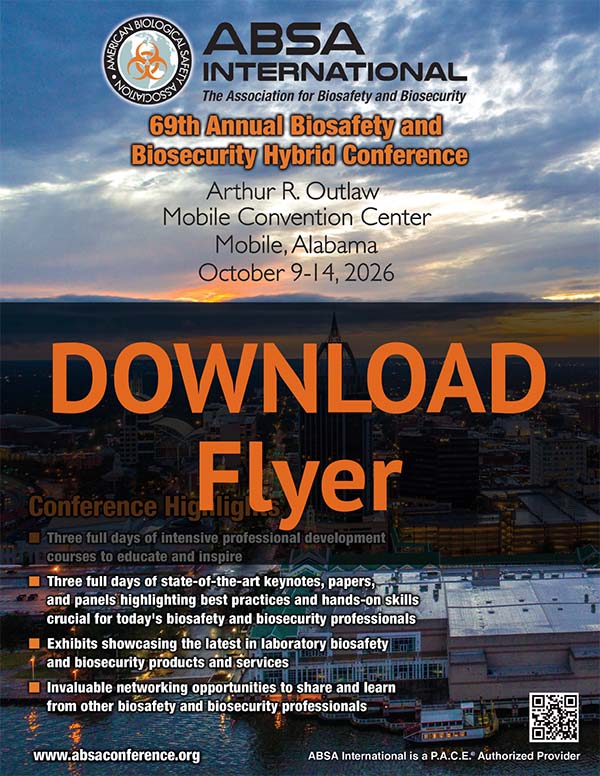Call for Course Proposals and Platform/Poster Abstracts
You are now able to submit proposals for ABSA International’s 69th Annual Biosafety and Biosecurity Conference. The conference will take place on October 10-14, 2026, in Mobile, Alabama. We anticipate 650 attendees and over 70 commercial exhibits. The professional development courses will take place Saturday, October 10 and Sunday, October 11. The conference presentations (platform/poster) will take place Monday, October 12 to Wednesday, October 14.
The Call for Professional Development Course Proposals submission deadline
March 13, 2026, 11:59pm Central
The Call for Platform/Posters Abstract submission deadline
March 30, 2026, 11:59pm Central
If English is not your first language, ABSA International has volunteers from the International Engagement Committee who are willing to work with you to refine your abstract submission.
Please contact education@absa.org no later than two weeks prior to the submission deadline with Abstract/Proposal Assistance in the subject line.
How to Submit a Course Proposal or Platform/Poster Abstract
For previous users: you will use your login information from the previous year. For new users only: you will need to create an account on the OASIS system. To do so, select “Click here to create a new user account”. You will be prompted to enter your contact information, and to select a new login and password for use with the abstract submission system.
Please note: if you forget your password, you will need to click the link “Click here if you have forgotten your password” on the OASIS login page. The ABSA office will not be able to retrieve this information for you.
- Follow the instructions as requested by the submission site and complete all submission steps
- To complete each step, make sure that you have entered information into all the required fields and click the “Continue” button to save your work
- When you have completed your work, click on the “review my work” link to verify that your submission is complete and appears the way you want to submit it
- If requested, the Oasis Abstract System will send you a confirmation email once your submission is complete
Course Proposals Submission Guidelines
Submission Deadline: March 13, 2026
ABSA Requirements
- All sections to the submission site will need to be completed as requested
- Carefully read the instructor guidelines prior to starting your submission.
- Please be sure to read through all the policy information within the submission sites
The course description is limited to 2000 characters including spaces.
Preparing Your Course Proposal Submission
Subject/Topic Areas
Animal Biosafety
Applied/Empirical Biosafety
Arthropods/Plants & Biosafety
Behavior/Enhancing Compliance
Biosafety Fundamentals
Biosecurity
BSL3-Ag or Large Animals
Cell and Gene Therapy
Disinfection/Biowaste Management
Emergency Preparedness and Response
Emerging Techniques, Equipment, Science or Issues
Facilities/Equipment (BSL-3)
Facilities/Equipment (General)
Facility Design, Infrastructure, Remodel
Field Biosafety/Studies
Human Source Materials Mammalian Cell Lines
Industrial Biosafety
Infectious Substance Transportation
Large-scale Biosafety and GMP Considerations
Microbiology
Molecular Biology
Occupational Health/Medical Surveillance/PE
Other
Practices/PPE (BSL-3)
Practices/PPE (General)
Program Management (Implementation, Management, Assessment)
Public Health
Regulatory Compliance/Issues/Guidelines
Risk Assessments
Select Agents (Agent Inactivation, Programs, etc.)
Shipping/Permits
Synthetic Biology
Training, Human Factors and Behavior
Review Process
Each of the submissions will be reviewed by ABSA International’s Preconference Course Committee. Notifications of acceptance will be made during the month of May.
If you have any questions, please contact Kari DeServi at education@absa.org.
Platform/Poster Abstract Submission Guidelines
Submission Deadline: March 30, 2026
ABSA Requirements
Author names and institutions must be listed correctly in the system. The primary author is expected to be onsite at the conference location if your abstract is selected. There is no option for virtual presentations.
Review the abstract and make sure it is in FINAL presentation format before submitting it. It will be published as written.
Subject/Topic Areas
Subject/Topic Areas
Animal Biosafety
Applied/Empirical Biosafety
Biosafety Program Implementation, Management and Assessment
BSL-1 and BSL-2
BSL-3 and BSL-4
Cell and Gene Therapy
Complying with Regulations and Guidelines
Emerging Hazards and Risk Assessment Strategies
Emerging Techniques, Equipment, and Science
Facility Design and Infrastructure
Field Biosafety
Growing and Supporting the Biosafety Profession
Large Scale Biosafety and GMP Considerations
Occupational Health
Plants and Arthropods
Public Health
Selection, Operation, Validation of Biosafety Equipment
Supporting Biosafety Beyond the Lab: Hospital Labs, Clinical Trials, etc.
Training, Human Factors, and Behavior
Unique Challenges and How to Overcome Them
Review Process
Each of the abstract submissions will be reviewed by ABSA International’s Scientific Program Committee. Notifications of acceptance will be made during the month of May.
If you have any questions, please contact Colleen Thomas at education@absa.org





